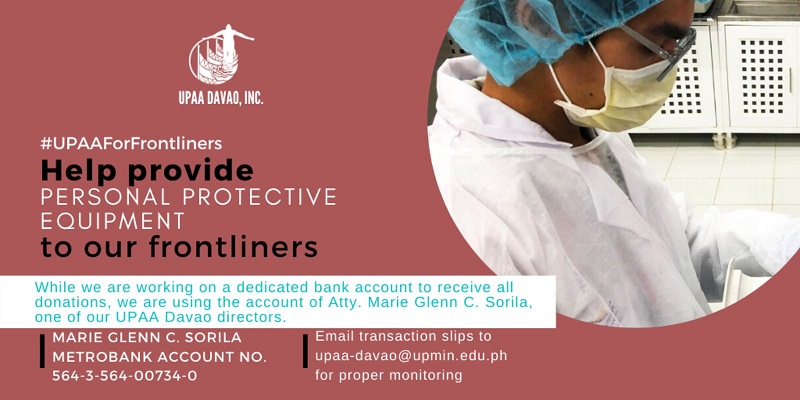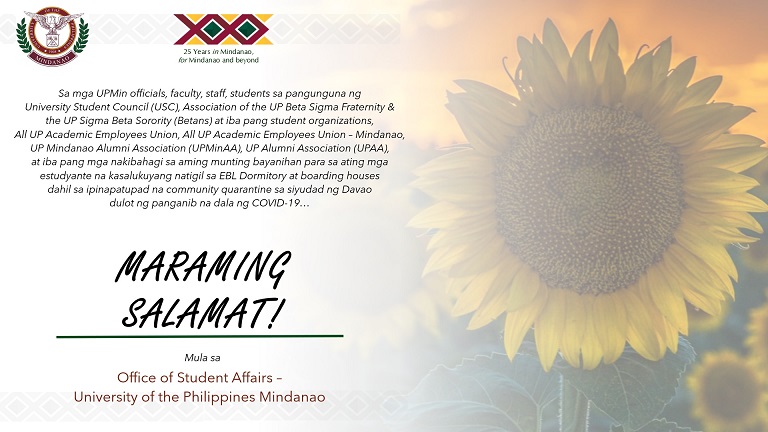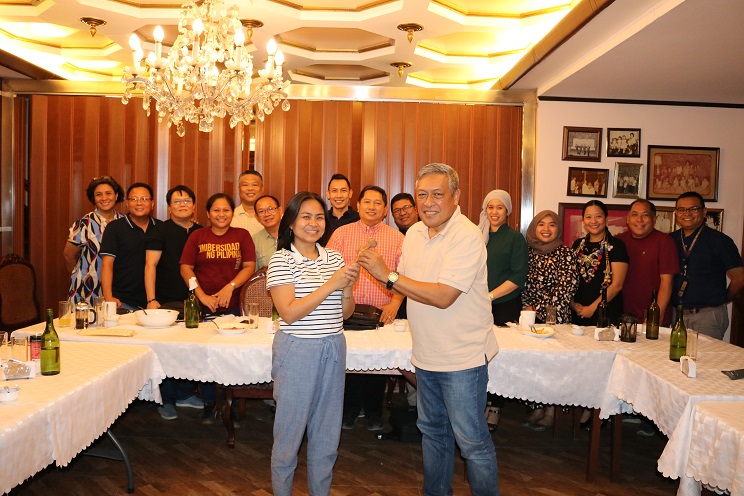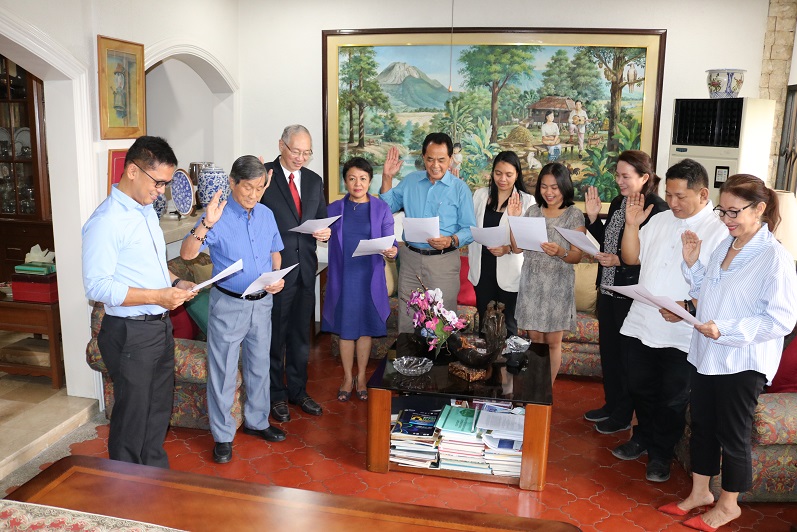UP Mindanao Bulletin, 15 March-3 April 2020
15 March 2020–3 April 2020
MESSAGE FROM THE CHANCELLOR
“In the past two years, we have experienced major disruptions. Last year, we had to deal with the various earthquakes that hit Mindanao. This year, we—and the rest of the world—face another threat in the form of a pandemic caused by the coronavirus disease.
“What disruptive events such as this pandemic teaches us is the importance of focusing on what really matters. And right now, during this difficult time, what the university is focusing on is taking care of its constituents, particularly our students, our teaching and nonteaching staff, and our non-UP contractual staff.”
—Prof. Larry N. Digal, PhD, Chancellor
READ FULL MESSAGE HERE: https://bit.ly/3dSW7rK
IMPORTANT REMINDERS AND NOTICES
8 April 2020 | Deadline for submission of work accomplishment for 17–31 March 2020
4 April 2020 | Bayanihan for our non-government service, security, and sanitation personnel (Read letter here: https://bit.ly/2xV3FcV)
30 March–15 April 2020 | Ongoing work-from-home (WFH) training for all UP Mindanao personnel
UP MINDANAO COVID-19 TRACKER
ISSUANCES
02 April 2020 | UP System IT. Reminder on Secure Zoom Meeting Sessions. (Email sent to everyone)
25 March 2020 | Memorandum no. LGSB 2020-017. Submission of Project Proposals for UPSA Funding Request. https://bit.ly/2V4pS0i
20 March 2020 | Memorandum no. OVPAA 2020-40. Payment of Salaries of Lecturers and Teaching Assistant/Teaching Fellows up to 15 April 2020. https://bit.ly/2XcA9Kv
17 March 2020 | UP System IT. Zoom Video Conferencing Access for UP Faculty and REPS. (Email sent to everyone)
17 March 2020 | Memorandum no. OVPAA 2020-39. Addendum to Memorandum no. OVPAA 2020-38 on the Suspension of Classes in All UP Constituent Universities Except UP Open University. https://bit.ly/2JK40BW
13 March 2020 | Memorandum no. NGY 2020-44. Implementation of Alternative Work Arrangement. https://bit.ly/3e29bLM
05 March 2020 | Memorandum no. NGY 2020-33. CSC Guidelines on the Procedure of Availment of Leave Privileges for Absences Incurred in Relation to Self-Quarantine and/or Treatment of Public Sector Officials and Employees Relative to COVID-19. https://bit.ly/2wlKKI6
UP Mindanao Memoranda and Other Releases
https://bit.ly/3c6lSDx
1 April 2020 | Memorandum no. MTRE 2020-005. Misting/Disinfection of the City Health Office in UP Mindanao on 1 April 2020. https://bit.ly/2XeVEdE
26 March 2020 | Memorandum no. LND 2020-40. Work-from-home (WFH) training for all UP Mindanao personnel from 30 March to 15 April 2020. https://bit.ly/2X4jBUR
20 March 2020 | Memorandum no. LND 2020-034. Clarification on the Early Release of Salaries of Non-UP Contractual Personnel and Project-based Personnel. https://bit.ly/2xTyzT0
19 March 2020 | Memorandum no. LND 2020-033. Skeletal Force During Community Quarantine and Possible Lockdown Due to COVID-19 https://bit.ly/2JHL86L
18 March 2020 | Memorandum no. LND 2020-032. Work Arrangement During Community Quarantine Due to COVID-19 https://bit.ly/2X8dwH8
17 March 2020 | Memorandum no. LND 20200-031a. Early Release of Salaries of Regular and Non-UP Contractual Personnel and Project-based Personnel. https://bit.ly/2RgWbrF
17 March 2020 | Memorandum no. LND 2020-031b. Requirements for Early Release of Salaries of Non-UP Contractual Personnel and Project-based Personnel. https://bit.ly/3bVBRUO
17 March 2020 | Memorandum no. LND 2020-029. Release of P25K CNA incentive. https://bit.ly/2Rd9wkE
16 March 2020 | Memorandum no. LND 2020-028. Reiteration of the Suspension of Work and Cancellation of Classes. https://bit.ly/2UMcAqr
16 March 2020 | Memorandum no. LND 2020-27A. Clarification on Memorandum no. LND-27, “Implementation of Alternative Work Arrangement in Relation to COVID-19 Code Red Sublevel 2 and Community Quarantine in Davao City” https://bit.ly/39Seni0
15 March 2020 | Memorandum no. LND 2020-27. Implementation of alternative work arrangement in relation to COVID-19 Code Red Sublevel 2 and community quarantine in Davao City https://bit.ly/3bOvvq2
13 March 2020 | Memorandum no. NBO 2020-16. Online mode of instruction. https://bit.ly/39MCVsy
Others
Reference Materials
01 April 2020 | UP Philippine General Hospital Bayanihan Na! Operations Center is launched. Dial 155200 for assistance. https://publicservice.up.edu.ph/uppgh-bayanihan-na/
28 March 2020 | “Processing and release of 2020 UPCAT results suspended due to ECQ” (Philippine Daily Inquirer) https://bit.ly/3aNXLJj
27 March 2020 | “Villanueva: State universities, colleges, need raw materials, support to continue initiatives against COVID-19” (Manila Bulletin). https://bit.ly/2JEe53o
26 March 2020 | “LGUs to support proposed laboratory" (The Mindanao Times). https://bit.ly/2UWhnV0
26 March 2020 | “Call for volunteers for COVID-19 Testing Lab” (Philippine Genome Center-Mindanao). https://bit.ly/2wWJ5Jq
26 March 2020 | UP Alumni Association Davao, Inc. has launched a donation drive to provision public health frontliners (UPMin Facebook page). https://bit.ly/2V8TZ6P
23 March 2020 | “UP Mindanao proposes diagnostic program to test for COVID-19 in Davao City” (Manila Bulletin). https://bit.ly/3aQOQXC
20–28 March 2020 | Alumni, officials, staff, and students donated food and personal necessities for students stranded at the dormitory and nearby boarding houses (UPMin Facebook page). https://bit.ly/3e8to2u; https://bit.ly/34ePV96; https://bit.ly/3bWpnME
20 March 2020 | Launch of Online Portal of University of the Philippines CoViD-19 News and Information. https://www.up.edu.ph/index.php/covid-19-updates/
CONTACT DETAILS
Rene Estremera
Public Relations Officer
Email:
Messenger: https://www.facebook.com/pg/UPMindanao/services/

The UP-PGH has launched Bayanihan Na! COVID-19 Operations Center! Call 155-200 for your questions about COVID-19 and how to volunteer and donate.
Full story here: https://www.up.edu.ph/bayanihan-na-up-pgh-launches-covid-19-ops-center/
Visit https://publicservice.up.edu.ph/uppgh-bayanihan-na/ to learn more about the operations center via UP Public Service
The effects of the COVID-19 virus has strained our health care system, particularly our health care frontliners: doctors, nurses, technicians, and hospital staff. Our health frontliners need Personal Protective Equipment (PPE) to continue working effectively to limit the spread of COVID-19. Hence, the UPAA Davao Chapter would like to ask your help in raising funds for provision of these PPE. While we are working on a dedicated bank account to receive all donations, we are using the account one of our UPAA-Davao directors. Please send your donations to:
 Sa mga UPMin officials, faculty, staff, students sa pangunguna ng University Student Council (USC), Association of the UP Beta Sigma Fraternity & the UP Sigma Beta Sorority (Betans) at iba pang student organizations, All UP Academic Employees Union, All UP Academic Employees Union-Mindanao, UP Mindanao Alumni Association (UPMinAA), UP Alumni Association-Davao Chapter (UPAA-Davao), UP Mindanao Foundation (UPMFI), at iba pang mga nakibahagi sa aming munting bayanihan para sa ating mga estudyante na kasalukuyang natigil sa Elias B. Lopez Hall dormitory at boarding houses dahil sa ipinatutupad na community quarantine sa siyudad ng Davao dulot ng panganib na dala ng COVID-19 ...
Sa mga UPMin officials, faculty, staff, students sa pangunguna ng University Student Council (USC), Association of the UP Beta Sigma Fraternity & the UP Sigma Beta Sorority (Betans) at iba pang student organizations, All UP Academic Employees Union, All UP Academic Employees Union-Mindanao, UP Mindanao Alumni Association (UPMinAA), UP Alumni Association-Davao Chapter (UPAA-Davao), UP Mindanao Foundation (UPMFI), at iba pang mga nakibahagi sa aming munting bayanihan para sa ating mga estudyante na kasalukuyang natigil sa Elias B. Lopez Hall dormitory at boarding houses dahil sa ipinatutupad na community quarantine sa siyudad ng Davao dulot ng panganib na dala ng COVID-19 ...
MARAMING SALAMAT!
Mula sa Office of Student Affairs, University of the Philippines Mindanao
###
March 20, 2020
Dear members of the UP community:
I would like to express my sincere gratitude and appreciation to you all for your amazing response to this crisis—a global situation the likes of which we have not seen in our lifetimes. We have been forced to suspend classes, work and all other campus activities, and to stay inside our homes and practice social distancing, all to contain the spread of the coronavirus (COVID-19) and to keep our healthcare system from being dangerously overwhelmed. For some of us, the effects of these measures on our finances, work, and social lives, and on our mental and physical health, have been devastating.
Yet, I have seen UP rise magnificently to the challenge. Every constituent unit, every sector, and every member of the UP community has demonstrated and continues to demonstrate incredible courage, resourcefulness, intelligence, selflessness, and compassion. Our scientists have used their knowledge to help their fellow Filipinos. Our medical and health practitioners, including our interns, are serving heroically at the frontlines of this war. Our faculty are exploring new ways and alternative platforms to fulfill their mission to teach, no matter the circumstances.
Our skeleton staff are working to keep our University running and to protect our communities. Our administrative officials have been tirelessly steering the University through rough waters. And our students, alumni and campus residents are doing their part by using their training to build sanitation tents for public use, or by donating food and supplies to fellow members of the UP community in need, or by campaigning for support for our doctors, nurses and health centers, or by simply doing what they can to educate, to ease people’s burdens, and uplift their spirits.
You are all an inspiration to us. Ang iskolar ng bayan ay tunay na maaasahan.
I cannot say for certain how the future will be shaped by this global crisis. However, I can assure you that we will keep moving forward as one UP community. We will continue to harness the expertise of the country’s premier community of scholars to make thoughtful and informed decisions. We will continue to communicate with you and disseminate information as often as possible. We will support your efforts to help yourselves, your families and your communities. Together, we will emerge stronger, better, and more united than ever.
We must and will remain in touch with one another. To facilitate this and to make sure that we disseminate and receive only official and verified information at a time when misleading and even dangerous rumors abound, we are opening a dedicated webpage at https://www.up.edu.ph/index.php/covid-19-updates/ for the UP community. I urge you to bookmark and to follow that page for future announcements and updates, and stay safe.
Once again, I thank all the individuals and teams who are toiling bravely through this uncertain time. Thank you for showing the world what honor and excellence in the service of the Filipino people truly mean.
Maraming salamat po.
Naglilingkod,
Danilo L. Concepcion

 UP Alumni Association-Davao Chapter elected new directors in elections held on 22 February 2020; the directors selected the chapter officers from among themselves in the proclamation meeting on 29 February.
UP Alumni Association-Davao Chapter elected new directors in elections held on 22 February 2020; the directors selected the chapter officers from among themselves in the proclamation meeting on 29 February. 